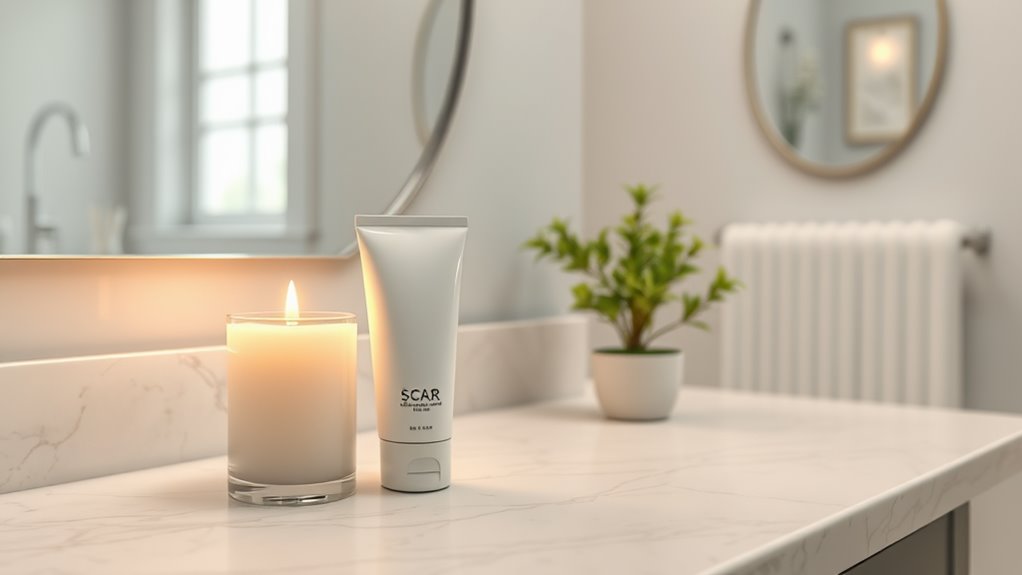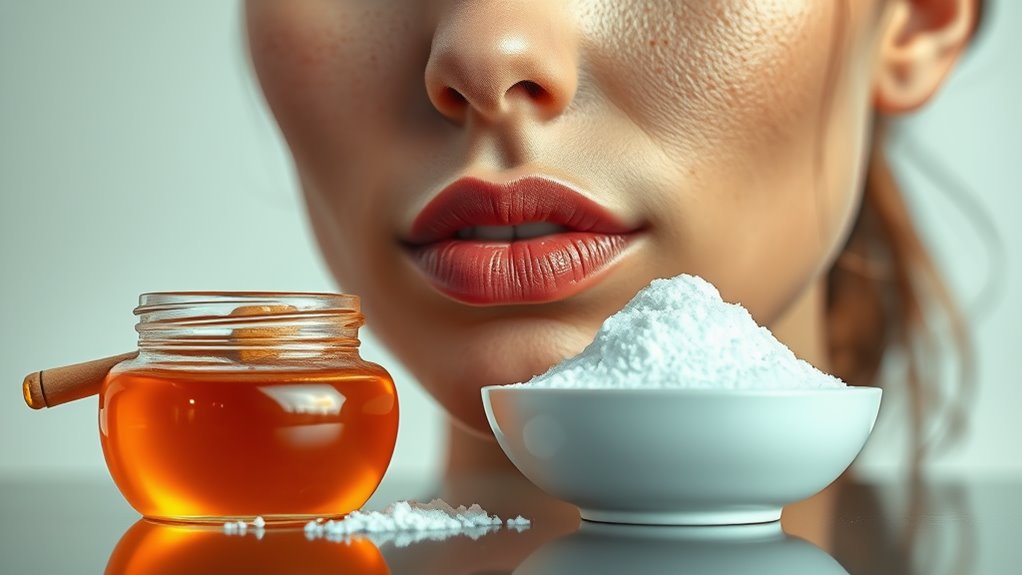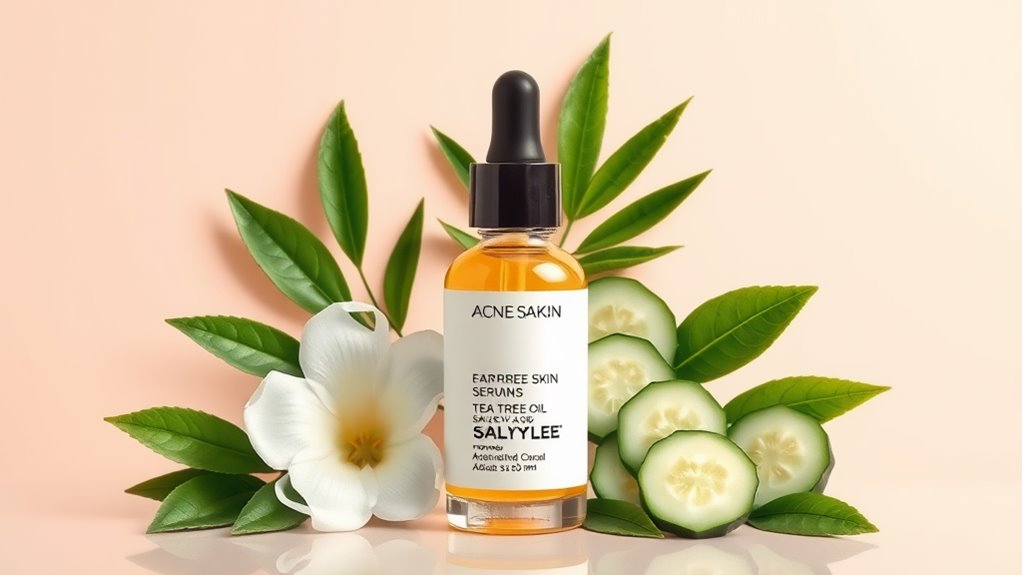The Best Skincare Routine for Oily Skin
If you have oily skin, you know how challenging it can be to find the right skincare routine. Excess oil can lead to breakouts and a shiny complexion, making it essential to strike the right balance. A well-structured regimen can help you manage oiliness effectively. Let’s explore the key steps and products that can transform your skincare game, starting with the basics of understanding your skin’s unique needs.
Key Takeaways
- Start with a gentle foaming cleanser containing salicylic acid to effectively remove excess oil without irritating the skin.
- Use a toner with witch hazel or salicylic acid to help tighten pores and control shine throughout the day.
- Apply a lightweight, oil-free moisturizer with hyaluronic acid to maintain hydration without clogging pores.
- Incorporate targeted treatments like niacinamide serums to specifically reduce oiliness and improve skin texture.
- Always use a non-comedogenic gel-based sunscreen to protect your skin without adding excess oil.
Understanding Oily Skin and Its Causes
Oily skin can be frustrating, especially when you don’t fully understand its causes. It often results from overactive sebaceous glands producing excess sebum, which can lead to clogged pores and breakouts.
Genetics plays a significant role in your skin’s oiliness, so if your parents had oily skin, you might too. Hormonal fluctuations, particularly during puberty or menstruation, can also ramp up oil production.
Stress and diet are additional factors; consuming high-sugar or greasy foods can exacerbate the issue.
To manage oily skin, consider implementing oily skin tips, like using lightweight, non-comedogenic products and regular exfoliation to prevent buildup.
Understanding these causes empowers you to take control and choose the right strategies for your unique skin type.
Essential Steps in a Daily Skincare Routine
When crafting a skincare routine for oily skin, it’s essential to focus on balancing oil production while keeping your skin hydrated and clear.
Start with a gentle foaming cleanser to remove excess oil without stripping your skin. Follow this with a toner containing ingredients like witch hazel or salicylic acid to tighten pores and control shine.
Next, apply a lightweight, oil-free moisturizer to maintain hydration without clogging your pores. Incorporate a targeted treatment, like a serum with niacinamide, to help reduce oiliness and refine texture. Additionally, consider introducing ingredients like natural remedies that can aid in brightening the skin and fading dark spots.
Finally, don’t forget the sunscreen; opt for a gel-based formula that won’t weigh you down. Stick to this routine consistently for a balanced and radiant complexion.
Recommended Products for Oily Skin
Finding the right products for oily skin can make all the difference in achieving a balanced and clear complexion.
Start with a gentle, foaming cleanser that contains salicylic acid or tea tree oil to deeply cleanse without stripping your skin.
For toners, opt for those with witch hazel or glycolic acid to minimize pores and control oil.
When it comes to moisturizers, choose lightweight, oil-free formulas, ideally with hyaluronic acid to hydrate without adding excess oil.
Incorporate a clay mask into your routine once a week to absorb oil and detoxify your skin.
Finally, look for non-comedogenic sunscreens that won’t clog your pores.
Mastering your product selection is key to controlling oil and maintaining a radiant look.
Lifestyle Habits to Support Oily Skin Care
Using the right products is just one part of managing oily skin; your lifestyle habits play a significant role too.
Start by drinking plenty of water daily to keep your skin hydrated and flush out toxins. Incorporate a balanced diet rich in fruits, vegetables, and healthy fats while avoiding excessive sugar and processed foods, which can trigger oil production.
Regular exercise not only improves circulation but also helps control stress levels, reducing the chance of breakouts. Make sure you get enough sleep each night, as rest supports skin regeneration. Additionally, chronic stress can lead to accelerated aging, which may worsen skin conditions like oiliness.
Finally, practice good hygiene by washing your pillowcases and towels frequently to minimize bacteria and oil transfer.
Expert Tips for Managing Oily Skin
To effectively manage oily skin, it’s essential to adopt a few expert strategies that can make a significant difference.
First, invest in a gentle foaming cleanser that targets excess oil without stripping your skin. Incorporate a toner with salicylic acid to minimize pores and control shine.
Next, choose lightweight, oil-free moisturizers to hydrate without adding grease. Don’t skip sunscreen; opt for a non-comedogenic formula that protects without clogging pores.
Exfoliate regularly, but avoid harsh scrubs—chemical exfoliants are more effective and gentler.
Finally, consider using blotting papers throughout the day to absorb excess oil without disturbing your makeup.
Frequently Asked Questions
Can Oily Skin Still Be Dehydrated?
Yes, oily skin can absolutely be dehydrated. You might notice tightness or flakiness despite excess oil. It’s vital to balance hydration without adding oiliness, so using lightweight, hydrating products is essential for your skin’s health.
Is It Safe to Use Oil-Based Products?
Yes, it’s safe to use oil-based products, but choose wisely. Look for non-comedogenic oils that won’t clog your pores. Balancing hydration can enhance your skin’s look and feel without adding excess shine.
How Often Should I Exfoliate Oily Skin?
You should exfoliate oily skin two to three times a week. This frequency helps remove excess dead skin cells without over-stripping, keeping your complexion balanced and preventing breakouts. Adjust based on your skin’s response.
Can Diet Affect Oily Skin?
Yes, your diet can greatly affect oily skin. Consuming high-sugar and fatty foods may increase oil production. Instead, focus on a balanced diet rich in fruits, vegetables, and healthy fats to help manage your skin’s oiliness.
Are Home Remedies Effective for Oily Skin?
Home remedies can be effective for oily skin, but results vary. You’ll find ingredients like tea tree oil and aloe vera helpful, yet consistency in application is key to achieving the best outcomes for your skin.
Conclusion
Incorporating the right products and habits into your skincare routine can make a world of difference for oily skin. Remember to cleanse gently, tone effectively, and hydrate with lightweight formulas. Don’t forget to incorporate targeted treatments and always protect your skin with sunscreen. By following these steps and embracing good lifestyle habits, you’ll keep excess oil at bay and achieve that balanced, healthy glow you’ve been pursuing. Your skin will thank you!





